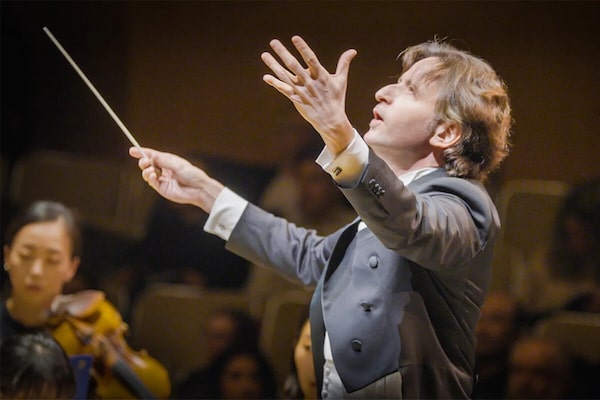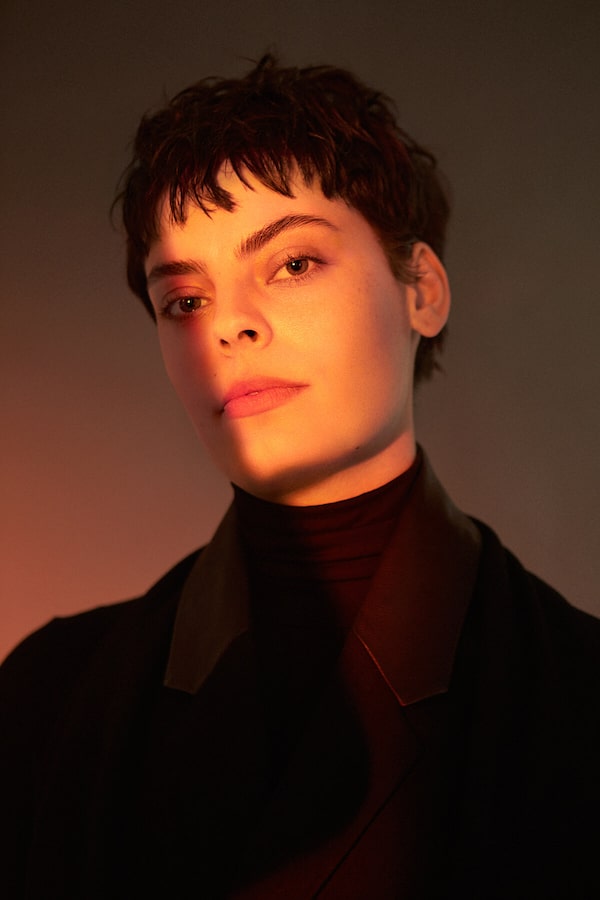
TSO music director Gustavo Gimeno will shake up the concert hall with Igor Stravinsky’s masterpiece, The Rite of Spring, on April 5.Allan Cabral
Igor Stravinsky’s The Rite of Spring shook the foundations of Western classical music when it premiered in Paris in 1913. This spring, the Toronto Symphony Orchestra will blow apart that seminal “art bomb” and examine its inner workings.
Symphony Exploder, on April 5 at Roy Thomson Hall, finds TSO music director Gustavo Gimeno and the full orchestra deconstructing Stravinsky’s masterwork with the help of Song Exploder host Hrishikesh Hirway, in the first live, classical version of Hirway’s popular podcast-turned-Netflix series.

TSO Spotlight Artist, mezzo-soprano Emily D’Angelo, appears May 1-2.Mark Pillai Photography
Gimeno says it was the TSO’s idea to approach Hirway, whose long-running podcast usually dissects pop songs.
“We wanted to give our audience the same kind of access to an iconic piece from the classical repertoire,” he explains. “And one that is not only timeless but also has a compelling story,” he adds, alluding to the alleged riot that broke out at the 1913 premiere.
In what is being described as a “live listening party,” Gimeno and Hirway will scrutinize Stravinsky’s composition, while the orchestra will replay sections to focus on its inner workings – culminating in a performance of the entire piece.
Gimeno says the event will not only add a new facet to the TSO’s programming, but also provide a welcome encore of the Rite, which opened the orchestra’s 101st season this fall.
“It’s still in our system,” Gimeno says, and the musicians are eager revisit it.
Symphony Exploder is just one of the exciting programs in this spring’s classical music lineup, where the old goes arm-in-arm with the new.
The TSO continues its commitment to introduce new pieces at every one of its Masterworks concerts this season. Among the upcoming highlights is Canadian composer Samy Moussa’s Trombone Concerto, making its North American debut in an April program headlined by Richard Strauss’s tone poem Don Quixote.
In June, Métis composer Ian Cusson’s To Live (Ikiru) receives its world premiere alongside works by Bartók, Mendelssohn and Mozart.
Cusson’s piece was commissioned by the TSO in partnership with the Centre for Addiction and Mental Health (CAMH) and the composer created it with input from CAMH clients. While the work has been played there by a chamber ensemble of TSO musicians, Gimeno is looking forward to conducting its orchestral version at Roy Thomson Hall.
Gimeno says the plethora of new work has been a challenge for the orchestra’s musicians but one they’ve embraced with enthusiasm: “Their playing has been amazing.” He adds that the feedback from TSO patrons has been overwhelmingly positive. “They tell me ‘It’s always wonderful to listen to Mozart or Beethoven, but to hear so much new stuff is refreshing.’ We have a lot of curious listeners in our audience and that’s good to see.”
Over at the Royal Conservatory of Music, the month of May sees the welcome return of those new-music champions, the Kronos Quartet. The ever-adventurous avantgarde string ensemble, now in its 51st year, returns to Koerner Hall with a new cellist, Paul Wiancko, and a program that includes the Canadian premiere of a Kronos commission by Sun Ra, Terry Riley and Sara Miyamoto called Kiss Yo’ Ass Goodbye.
Kronos is part of the Royal Conservatory’s 21C Music Festival, which also boasts another avantgarde icon, musician and performance artist Laurie Anderson, in April. For more traditional tastes, the RCM is presenting the visiting Philadelphia Orchestra, under the baton of Montreal-born dynamo Yannick Nézet-Séguin, for an April concert that includes works by Rachmaninoff and the trail-blazing African-American composer Florence Price.
Renowned soprano Measha Brueggergosman-Lee performs in Opera Atelier’s All is Love, in AprilBruce Zinger
Songs of freedom: Opera Atelier’s love-in
When Opera Atelier first set out to stage a musical celebration of love, in 2022, it came up against an unexpected obstacle – the “freedom convoy” truckers’ protest in Toronto.
All is Love opened in February of that year, just as police had shut down the streets around OA’s downtown venue, Koerner Hall, in anticipation of the mass protest against COVID-19 restrictions. Still, some 250 intrepid concertgoers made it to the one-night-only performance, on foot or by subway, and their enthusiastic response was enough to encourage a remount.
This April, All is Love is back, hoping to thrill a larger audience with its exploration of the mysteries of love via an imaginative mix of Baroque and fin-de-siècle gems.
One of the delightful surprises of the program was the way the company, famous for its interpretations of 17th- and 18th-century classics, unexpectedly paired them with works straddling the 20th century. The latter include art songs by Reynaldo Hahn and the opening scene of Claude Debussy’s 1902 opera, Pelléas et Mélisande.
The juxtaposition is actually a natural one, says David Fallis, OA’s music director. “Debussy and Hahn were very aware of, and influenced by, their own French Baroque traditions,” he notes. And Pelléas et Mélisande, in particular “is very reminiscent of early 17th-century Italian opera, especially Monteverdi.”
The evening opens with a mash-up of songs by Hahn and English Baroque composer Henry Purcell, sung by company stalwarts, including Colin Ainsworth and Meghan Lindsay and the renowned soprano, Measha Brueggergosman-Lee – “just to make the point that we’re going to be interweaving different eras,” Fallis says.
From there, it winds its way through 18 pieces, sung by Brueggergosman-Lee and other company stalwarts, including Colin Ainsworth and Meghan Lindsay, and danced by the full corps of the Atelier Ballet, led by Eric César de Mello da Silva in the role of a winged Love. Fallis conducts the Tafelmusik Baroque Orchestra.
The works include excerpts from operas by Handel and Lully, dances by Rameau and tunes by Charpentier and Locke. The highlight, however, is the sampling from Debussy’s misty, mysterious Pelléas, reworked by assistant conductor Christopher Bagan for a chamber ensemble, which wowed the audience in 2022.
Fallis says he and Opera Atelier director Marshall Pynkoski would love to eventually stage the whole thing. “We’ve proved you don’t need an 80-piece orchestra for it to be effective.”
Advertising feature produced by Globe Content Studio. The Globe’s editorial department was not involved.